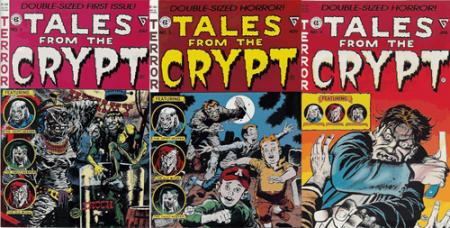For TV Horrors, Shorter is Better
Spurred by last night's premiere of "Fear Itself," I've been thinking a lot about television horror. About two years ago, my old roommates and I decided to switch from Time Warner Cable (aka Satan's Cable Service) to DirecTV. Ostensibly this change was about better sports coverage, but it came with an added bonus: Chiller.
As a horror fan, it is hard for me to do justice to how excited I was when I discovered this little gem of a channel. See, Chiller wasn't just a non-premium version of Showtime's genre-themed channel, it was an honest to god repository of horror history. The reason I watched nearly every day wasn't for "Critters 3," "Creepshow 2," or "Dr. Giggles," it was for excellent classic programming like "Night Gallery," "Alfred Hitchcock Presents," and the "Nightmare on Elm Street" show, "Freddy's Nightmares." As someone who grew up watching re-runs of "Monsters," "Tales from the Darkside," and "Tales from the Crypt," this was a revelation. Of course, it was about six months after the dish was installed that I moved out, so my Chiller romance was over by the time it really got started.
It's interesting though, to think about what NBC is trying to do with "Fear Itself" in the context of all those earlier horror related programs. Chiller really did offer a wide variety of horror programming: some shows, like "Freddy's Nightmares," were so unbelievably dated (the 80's!) as to make them virtually unwatchable. Other shows, Rod Serling's "Night Gallery" (intro above) being the best example, hold up remarkably well, and could even be called a revelation in regards to the quality of talent that used to work in TV.
For my money, the shows that succeeded most frequently were the ones that focused on shorter, one-off scares. "Monsters" and "Tales from the Darkside/Crypt" all came in at 30 minutes or less. "Night Gallery" was an anthology program that typically came in three or four sections over the course of an hour. This of course was similar to the show's more famous brother, "The Twilight Zone." The narrower focus of these shows, usually in the form of set-up, build, and then reveal (often a reversal), lent itself to the smaller screen. The producers behind these shows understood that TV is different from film, and watching a horror themed program in your living room is not the same as seeing a horror movie in the theater or even watching a DVD on the small screen.
In our group review of "Sacrifice," Eric mentioned commercial breaks, and that's really at the heart of this issue. I may have been in the minority, but I was largely a fan of "Masters of Horror." The episodes were more bad then they were good, but in the end, it was an hour of horror, sometimes even good horror, every week for a whole season. The episodes were allowed to develop without the threat of a tense moment being shattered by an ad for Doritos or restless leg syndrome drugs.
On Showtime, "Masters" gave some interesting filmmakers a chance to spread their wings in a smaller (and I would guess less pressure-filled) format. Sure they likely had to grapple with producers over artistic control, but at least they didn't have to edit themselves from the get go. (Side note: although I've not seen it, apparently Miike's episode, which was to be the Season 1 finale, was never aired because it was supposedly too horrific even for premium cable. Maybe someone else has insight into this.) For me, "Masters" episodes like "Incident On and Off a Mountain Road," "Pick Me Up," and "The Black Cat," had some fun things going on in them. Even when the shows were reductive and predictable I usually played along, because hell, it was TV.
"Monsters" and "Tales From the Darkside," both of which were always predictable, benefited from this viewing dichotomy all the more: "It's just TV, so it's okay if my horror experience isn't a terrifying ride every time." In my mind, that's what ended up weighing "Masters" down. The folks behind it pushed too hard. They tried to make the show into a collection of movies (Christ, look how much they want for the complete series on DVD), instead of letting it breathe as a TV show.

From one episode, my guess is that "Fear Itself" is going to make the same mistake as "Masters." The focus on one hour episodes, at least in the initial offering, seems to be a mistake, and it's not too hard to imagine the producers trying to hock feature length DVDs or the episodes once the season wraps. ("Did you like 'Sacrifice?' Then buy the 90 minute movie we actually shot!") Now, to be clear, none of this is to say that the existing format is a sure loser; it's not. Writing talent will be the hardest to come by, as there is unlikely to be much of a feeder for horror stories that can sustain 43 minutes of screen time, but no more. That was the beauty of HBO's "Crypt," they had a trove of amazing stories that they could rip right from the pages of EC's comics. Here, the scripts that get shot are more likely to be feature pitches that are then hacked down to size and edited for network. Could it work? Again, sure. But I'm not feeling optimistic, especially if they've already given up on the format once.
My dream, after my short love affair with Chiller, is that one day a producer will come along with the fire and grit of Rod Serling (bet you never thought you'd hear someone describe Rod Serling as gritty!), and give us the next generation of anthology horror. Take a peek at "Night Gallery" sometime, or even just some of the shorter format horror offerings. They might not provide back-to-back thrills, but at least you know that when one isn't working, it will be over soon, and you'll get another go at some scares soon.

